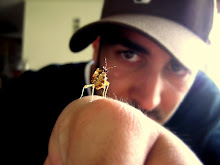I’ve always been interested in animals. Ever since I was a little kid and I had snakes and cats and rats as pets. I think most, if not all, kids have an inherent interest in animals and science because it involves the natural wonder of the planet around them. As children grow and learn, they grapple with defining who they are in large part by what relationship they share with all the other things that shape their world.
Science is taking a big hit in public education in the US right now. As the state tests here in California for example are designed more and more to evaluate only a student’s proficiency in math and literacy, more and more teachers are forced to spend an increasing amount of time on those subjects, because if their students don’t do well on the tests, the No Child Left Behind Act has ensured that the schools that those students represent will be penalized, which means less money, less funding, fewer resources, less pay for the teachers, larger classrooms, and a higher chance for student failure. So, naturally, the teachers continuously are forced to teach to the tests, and science falls by the wayside, along with art, sports, music, etc.
This situation spells disaster for our future because to deal with all of the man-made problems that face our planet, the next generation is going to need to be very scientifically aware. Finding solutions to pollution, water shortages, renewable energy needs--that’s going to take the collective efforts of a highly educated society that is conscious of what’s going on, and that consciousness needs to start at an early age. The world is changing. It’s changing because we changed it, so now we need to learn as much as we can to know how to slow those changes way down and deal with the consequences of ours and past generations’ more reckless actions.
Kids need to learn as much as they can about science, animals, and nature. Visit parks, zoos, aquariums and natural history museums in your area. There’s life in every neighborhood, you just have to know where to find it.
They biggest thing that you can do to help the planet is to reduce the amount of stuff you buy and use, reuse resources instead of throwing them away, recycle all of your renewables, and compost all your food scraps. One person can really make a positive impact by doing these four things, so just imagine what can be accomplished if everyone did them.
Remember, the power to change the world lies in your hands. Don't wait to act; our next generation is depending on you!
Subscribe to:
Post Comments (Atom)

No comments:
Post a Comment